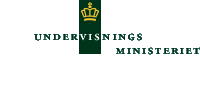
Chapter 1
Baltic 21 An AGENDA 21 for the Baltic Sea Region
Overall goals
Overall Goal for Sustainable Development in the Baltic Sea Region
»The essential objective of Baltic Sea Region co-operation
is the constant improvement of the living and working conditions
of their peoples within the framework of sustainable development,
sustainable management of natural resources, and protection of
the environment.« Sustainable development includes three
mutually interdependent dimensions – economic, social and
environmental.
 This
means for the region: This
means for the region:
- That a safe and healthy life is secured for current and future
generations.
- That a co-operative and prosperous economy and society is
created for all.
- That local and regional co-operation is based on democracy,
openness and participation.
- That biological and ecosystem diversity and productivity are
restored or maintained.
- That pollution to the atmosphere, land and water does not
exceed the carrying capacity of nature.
- That renewable resources are efficiently used and managed,
within their regeneration capacity.
- That materials flow of non-renewable resources is made efficient
and cyclic, and that renewable substitutes are created and promoted.
- That awareness of the elements and processes leading to sustainability
is high among different actors and levels of society.
- The Baltic Sea Region recognises its interdependence with
other parts of the world and makes its contribution to the fulfilment
of sustainable development goals at the global and European
level.
Overall Goal for Baltic 21 Education
- All individuals should have competence to support the development
that meets the needs of the present without compromising the
ability of future generations to meet their own needs.
- Education for sustainable development should be based on an
integrated approach to economic, societal and environmental
development.
 The
aims of Baltic 21 The
aims of Baltic 21
- To protect the Baltic Sea Region by reducing the environmental
impact of municipalities, industrial plants, agriculture and
transport.
- To co-operate regionally on environmental, economic and social
aspects. Regional cooperation is based on joint actions and
sector actions in eight sectors: agriculture, education, energy,
fisheries, forestry, industry, tourism and transport.
- To place emphasis on environmental aspects, including health
and spatial planning and to focus on long-term aspects and holistic
perspectives.
Sustainable development essentially aims at:
- Constantly improving the living and working conditions for
the peoples of the Baltic Sea Region.This is to be achieved
through sustainable management of natural resources and through
protection of the environment. Three interdependent dimensions
are included:
- - the environmental dimension
- - the economic dimension
- - the social dimension
Countries involved:
Baltic 21 comprises 11 countries and the European Commission.The
countries are Denmark, Estonia, Finland, Germany, Iceland, Latvia,
Lithuania, Norway, Poland, Northwest Russia and Sweden.
Baltic 21 is committed to democracy, open-and broad public participation.
Basic principles:
Sustainable development in Baltic 21 is based on
- The Precautionary Principle
- The “The Polluter Pays” Principle
These principles are based on international agreements including
the conventions on “Climate Change”, ”Biological
Diversity”, “Long-range Air Pollution”, “Protection
of the Marine Environment”, “Responsible Fisheries”
and “The Amsterdam Treaty”.
Introduction to Schoolwork on BALTIC 21 Sectors
Ask yourself the following questions:
- What are my expectations for the future?
- How would I like my life, and that of my children and their
children to be?
- What do I basically need?
- What do I just like to have or get without really needing
it?
- What am I willing to do in my private life to realise my expectations?
- How can I take part and work for a sustainable future?
Basically, we all need food, drinking water, air, health, friends,
love and care.
But is our food always healthy? Is our drinking water always
clean? Do we breathe clean air? Why do so many people fall ill,
become injured or even die in today’s traffic and industrialised
society?
The governments in 11 countries, namely Den-mark, Estonia, Finland,
Germany, Iceland, Latvia, Lithuania, Norway, Poland, North-west
Russia and Sweden, together with networks of cities and organisations
have decided on a regional Agenda for the 21st century: an Agenda
for the Baltic Region entitled “Baltic 21”. The governments
have defined aims and goals for sustainable development in the
following sectors: agriculture, education, energy, fisheries,
forestry, industry, tourism and transport.
Baltic 21 is committed to democracy, openness and broad public
participation.
Now ask yourself two more questions: “Do I agree with the
politicians? Do I want to take part?”
 What
does sustainable development mean to you? What
does sustainable development mean to you?
Purpose: To find out what each of us understands
by sustainable development:
Write two sentences
on sustainable development: one sentence that you really believe
will lead to sustainable development, and one sentence that you
consider will not (do not mark which one is which!).
In pairs: read
each other’s sentences and discuss which ones you believe
in and which ones you do not. If possible, come to an agreement,
and then share your ideas with other pairs.
Definition formulated by the Brundtland Commission, 1987:
“Sustainable development is development that meets the
needs of the present without compromising the ability of future
generations to meet their own needs”
Methodology
Schools can use the following three-step-methodology, generally
agreed among the Baltic Sea Project co-ordinators and educators:
- Step 1: Preparatory work
- Step 2: Practical work
- Step 3: Discussion
It is suggested that students take their starting point in one
of the general BSP themes or programmes (www.b-s-p.org), or in
any of the Baltic 21 sectors: sustainable agriculture, education,
energy, fisheries, forestry, industry, tourism and transport (www.baltic21.org).
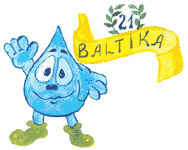
Alex Tulina, Russia
Preparatory work:
- In what subjects will you do your work?
- Can the work be interdisciplinary in approach, with several
subjects and teachers involved?
- Can practical work be done? What kind of practical work will
you do?
- What people, institutions, non-governmental organisations
(NGOs), and local politicians can be of use in your work?
Practical work:
- Make a list and a time-table for your actual practical work
- Make your results known to others!
Discussion
- How does your work lead to a more sustainable future?
Baltic 21 sector: Agriculture
Political sector goal – Agriculture:
Sustainable agriculture is the production of high-quality food
and other agricultural products and services with long-term impact
on economy and social structure. Sustainable agriculture means
that the resource base of non-renewable and renewable resources
is maintained. Sustainable agriculture will meet society’s
needs for food and recreation.
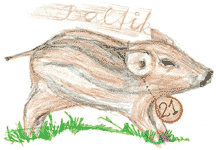
Pierre Geisler, Germany
Sustainable agriculture will preserve the landscape, cultural
values and the historical heritage of rural areas. Production
methods should not threaten humans or animals or degrade the environment,
including biodiversity. The ethical aspects of agricultural production
will be considered. Renewable resources should gradually replace
non-renewable resources.
Suggestions for schoolwork with Baltic 21 sector: Agriculture
Preparatory work:
- What kind of food production takes place in your area?
- What is the general attitude to farming and to the job of
a farmer in your area/country?
- What is the national policy concerning agriculture? Fertilisers?
Pesticides? Technology?
- What is the net production? Is your country selfsufficient?
What does your country import and export?
Practical Work:
Search local newspapers and make a selection of cuttings. What
kind of problems or discussions are presented in connection with
food production related to:
- human health?
- environmental impact?
- economic and social aspects of being a farmer?
- other aspects?
Make a study visit to a farm:
- What is produced? How is it produced? Where are products sold?
What is the farmer’s financial situation?
- What impact does the farm have on the landscape, the biodiversity
of the land, its cultural values, historical heritage, etc?
- Is the farm land used for recreational purposes – birds,
flowers, insects?
Make study trips to local food stores and select certain food
items, e.g. fruits or vegetables.
- Are the goods produced locally? How far have they been transported?
Discussion:
- What changes can be implemented to achieve the sector goals?
- Why are some people vegetarians?
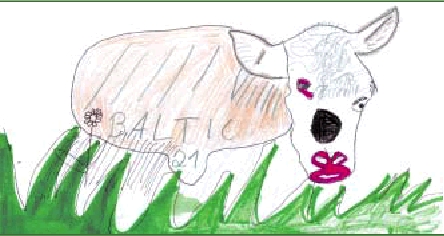
Benjamin Mühlichen, Germany
Baltic 21 sector: Education
Political sector goal – Education (Schools) :
The individual learner should have the knowledge, values and
skills to be an active, democratic and responsible citizen and
to participate in decisions at the personal level, as well as
at different levels within society, locally and globally, in order
to contribute to creating a sustainable society. Learners in vocational
education should also have skills and competences relevant to
their future professions.
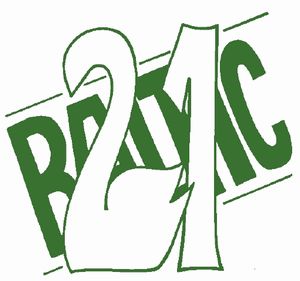
Malene Priske Meier, Denmark
Suggestions for schoolwork with Baltic 21 sector: Education
Preparatory work:
- Is education for sustainable development part of the overall
goal, the plan of , and the set of values in your educational
institution?
- Who is responsible for achieving the overall goals?
- Are all subjects in education equally responsible for sustainable
development?
- How does your school administration support work for a sustainable
future?
- Does your school have awards that show the school works for
sustainable development?
Practical work:
- Perform an eco-audit on your school. Perhaps using a questionnaire,
investigate the following topics:
- Biodiversity: Does your school have green surroundings and/or
a green school-yard? How is the area maintained? What species
of plants or trees grow near your school? Are there any old
trees? How far from your school is the nearest green area, such
as a park, a forest, a field, the beach? How often do classes
go there?
- Buildings: What materials were used to construct your school
building? Do you have access to open-air areas? What sort of
heating and ventilation system is used?
- Consumption of water, energy, electricity, paper and other
resources at your school: How much water, energy, etc. is consumed
per year per person? What are the sources?
What happens to the waste? How much money is spent per year on
each item? If possible: compare with previous years and with other
schools.
- Food: Does your school have a canteen? Does the canteen serve
organic food? Where do the raw ingredients come from?
- Transport: How do students and teachers get to school each
day: What percentage walk? What percentage cycle? What percentage
come by bus? What percentage come by train? By car? What reasons
do students or teachers have for their choice of transport?
- Waste: Are organic waste products composted? Are other materials
recycled? Are disposable or non-disposable materials used, etc.?
How much money is spent per year on waste disposal?
Discussion:
- How can your school be made more sustainable?
- How can your local progress evaluated or indicated?
- How can sustainability measured? What time-scale is needed?
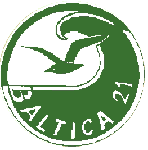
Ramona Rozmisa, Latvia
Baltic 21 sector: Energy
Political sector goal - Energy:
Sustainable energy concerns security of supply, the carrying
capacity of the environment, resource management, economy and
safety. Sustainable energy requires an increase in renewable energy
production and an increase in energy efficiency and energy savings.
Sustainable energy supply must not give rise to pollution that
exceeds the critical loads or levels of acidification (substitution
of high-carbon fossil fuels by low-carbon fossil fuels), eutrophication,
tropospheric ozone and global climate change. Hazards of nuclear
waste and nuclear energy production should be eliminated. Efficiency
can be increased by combined heat and power production and by
energy savings.
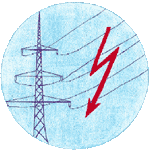
Angelika Rabiej, Poland
Suggestions for schoolwork with Baltic 21 sector: Energy
Preparatory work:
- What kind of energy production takes place in your area?
- To what extent is your country dependent on imported energy?
In what form, from where and from what sources?
- What indicators can be used to show the impact on the environment,
the impact on biodiversity, or the impact on human health by
energy production?
- What kind of sustainable energy has been introduced in your
area?
- What is the general and the political attitude to sustainable
energy forms such as wind turbines, solar cells, solar panels,
biogas, etc?
- Has opinion changed over the last five to ten years?
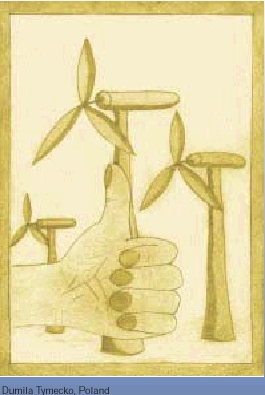
Practical work:
- How much energy is used for different purposes in your daily
life at home or at school?
- How can the amount be reduced?
- Make a study visit to an institution such as a power plant,
a wind-turbine, a combustion station (= a waste incinerator),
a municipality with biogas, or a pilot project, and find out
its resources, its efficiency and its possible impact on the
environment, for example with regard to acidification, eutrophication,
tropospheric ozone al climate.
- Is work there considered safe and cally acceptable?
Does the construction of the building change the landscape or
the cultural historical heritage?
Discussion
- What kind of energy savings would you be personally prepared
to make your life?
- Does the energy production in your area have an impact elsewhere?
Baltic 21 sector: Fisheries
Political sector goal - Fisheries:
Long-term strategies should be developed for major fish stocks
i.e. cod, salmon, herring and sprat. Important fish habitats should
be restored. Sustainable aquacultures should be achieved.
Sustainable fisheries require sound ecosystems, so that fish
stocks can replenish themselves, and the establishment of selective
fishing techniques.
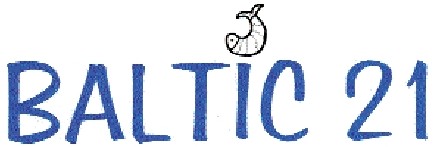
Paulina Ciesielska, Latvia
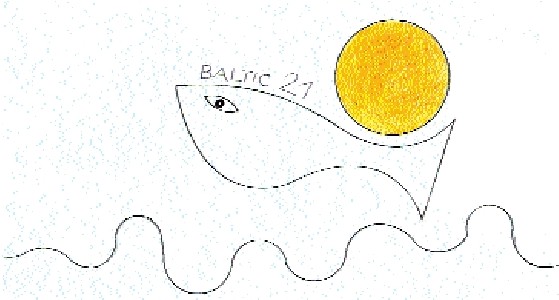
Niklaus Paegle, Latvia
Suggestions for schoolwork with Baltic 21 sector: Fisheries
Preparatory work:
- What species
of marine or freshwater fish do fishermen catch in your area?
- Where do the these species breed?
- What percentage of marine catches is made up of cod, salmon,
herring or sprat?
- What kind of ecosystem do these fish need during a lifetime?
- Which fishing techniques are used to catch fish? How far do
fishermen travel to catch fish?
- What is meant by selective fishing techniques?
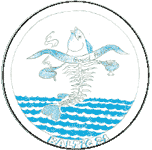
Janis Presis, Latvia
Practical work:
- Make a study
visit to a fisherman’s boat or to a fish fuction and investigate
the variety of species/biodiversity and the quantities. Are
the fish for human consumption or for the fish industry?
- What is the fisherman’s attitude to his job, including
the »quality of life«, and the financial rewards
offered?
- Visit a fish industry and investigate the products, the amount
of natural resources, the economy, etc. Are the goods for the
local market or for export?
- Visit
an aquaculture ("fish farm") and investigate the net production
size, the economy and quality of life of the people working
at the aquaculture: Are there any special precautions necessary
when feeding the fish, treating the fish, and treating the water?
Is there any special legislation regulating the establishment
of aquacultures in your area?
- Interview anglers on the coast or along the river bank about
their reasons and motives for angling
Discussion:
- What indicators can be used to establish whether a is viable
and replenishing itself?
- Are fish generally considered healthy food in your area?
Baltic 21 sector: Forestry
Political goal - Forestry:
Sustainable forestry maintains its biodiversity, its productivity,
its regeneration capacity and its vitality. Sustainable forestry
fulfils ecological, economic and social functions and does not
cause damage to other ecosystems, be it at local, national or
global levels. Consideration must be given to global carbon cycles,
conservation of biological diversity, and the productive functions
of wood and non-wood, in particular protective forest management
concerning soil and water. The promotion of wood and wood-based
products should emphasise wood as a natural renewable resource
that is environmentally friendly.
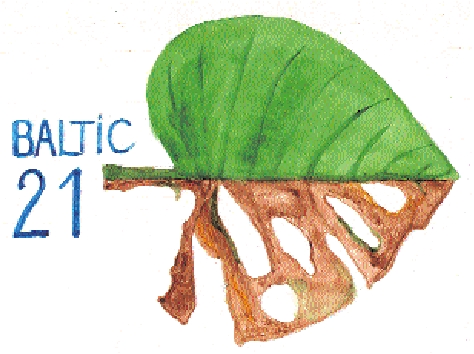
Edgars Kujatkoskis, Latvia
Suggestions for schoolwork with Baltic 21 sector: Forestry
Preparatory work:
- What percentage of your country is covered by forest? What
percentage of this is natural forest?
- Does legislation differ between national and private forests?
- What do people generally combine with the forest in your area?
- What do ordinary people use the forest for?
- Which tree species are harvested?
- What products are produced from wood from forests in your
area?
- Is waste wood used for any practical purpose other than fire
wood?
Practical work:
- Investigate the biodiversity of the forest e.g. by conducting
phenological studies.
- Interview people about their recreational use of the forest
(picking mushrooms and berries, roving and camping, mentally
relaxing etc).
- How can annual growth and net production be measured?
- What harvesting methods are used – clear-cuttings or
individual trunks? At what age are trees felled for other purposes?
- How does a lumberjack consider his “quality of life”
as a forest worker, and is his financial and social situation
acceptable?
- Any threats to forests in your area?
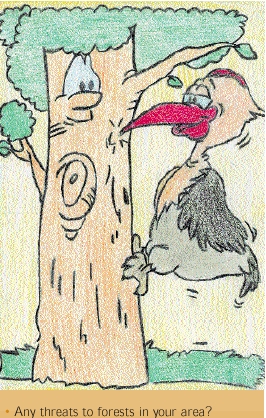
Joanna Kuligowska, Poland
Discussion:
- What is your definition of a forest? What characterises a
forest in your area?
- What emotional issues are connected to forests?
Baltic 21 sector: Industry
Political goal - Industry:
Sustainable development means economic, social, technical and
environmental improvements. Sustainable strategies apply to resources,
processes, products and services. Sustainable industry ensures
the availability of goods and services that satisfy human needs
and bring quality of life, whilst simultaneously reducing the
eco-logical impact and resource intensity throughout a lifecycle.
Ecological impact should not exceed the carrying capacity with
respect to biodi-versity, ecosystems and usage of natural resources.
Sustainable industry means improving the working environment and
safety of the workforce.
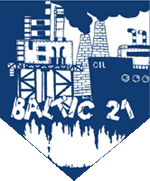
Rolands Salmins, Latvia
Suggestions for schoolwork with Baltic 21 sector: Industry
Preparatory work:
- Where are industries located in your area?
- Why are they located there?
- In what way have your local industries influenced the local
environment, its biodiver-sity, the quality of the water and
the air? What indicators can be used to investigate these factors?
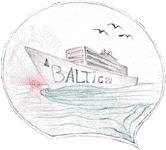
Maigonis
Preikss, Latvia
Practical work:
- Make a study
visit to a local industry, and find out about environmental
attitudes concerning production processes and waste. Find out
for different product categories what happens "from cradle to
grave": How are products manufactured? What resources are required?
What environmental hazards does the manufacturing process cause?
How are the products used by people who buy them? For how long
are they used? What happens after use of the product? Can the
product be recycled or does it end as a waste product?
- Industries can be awarded “green certificates”:
What standards are required to obtain such a certificate, and
in what way does this have an impact on the industry’s
image and economy?
Discussion:
- Market development
and the view and awareness of the consumer are of great importance:
Define what is meant by "the political/green consumer" and to
what extent increasing awareness puts pressure on industrial
goods to be more environmentally friendly.
- "From cradle to grave" projects have been carried out on industrial
products: What applied aspects bring "quality of life" to the
consumer?
- In what way do products "satisfy human needs" - and in what
way have the needs changed over the last decade or two?
- Hazardous waste products are often transported long distances
and deposited abroad: Do we need another planet?
Baltic 21 sector: Tourism
Political goal - Tourism:
Sustainable tourism is any form of tourist development or activity
which respects the environment, ensures long-term conservation
of natural and cultural resources, and is socially and economically
acceptable and equitable.
Sound environments should be sustained to conserve the recreational
quality of natural and manmade landscapes. Satisfactory social
conditions for tourists and the local population should be created.
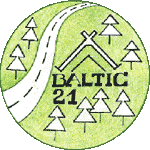
Uldis Mangulsons, Latvia
Suggestions for schoolwork with Baltic 21 sector: Tourism
Preparatory work:
- What do tourists do when visiting your area?
- What is the predominant means of transport?
- How can tourism be an environmental threat in your area?
- In what ways does tourism have positive and negative impacts
on your local area?
- What kinds of physical activity are offered and promoted in
your area?
Practical work:
- Bicycle maps have been produced for many local areas, clearly
marking sites of cultural or natural interest. Investigate the
map by making a bicycle trip and writing about your impressions
to the media. If your area does not have a bicycle map, make
one -perhaps with a demand to local politicians that special
bicycle routes be created away from other traffic.
- Nature trails can be created around the countryside: Design
a nature trail, making the signposts in co-operation with the
authorities and designing a plan to maintain it. Ask groups
of pupils and/or teachers to test the trail and report their
experiences to the local paper.
- Take part in restoring ecologically-important biotopes through
thematic activities, summer camps or excursions - be it by clearing
woodlands for endangered species of butterflies, planting grass
species or creating special paths to protect dunes from wind
erosion. Co-operate with the authorities on such a plan.
- Organise fishing trips, horseback safaris, survival trips,
etc in co-operation with the municipality and the local tourist
company.
- Design a tourist guide for your area that includes what makes
the area special to you as a local resident.
Discussion:
- What do you do in your leisure time?
- With regard to special biotopes, should endangered species
of plants or animals be presented on posters to the public or should
they be protected by means of not drawing attention to them?
- Define the term "ecotourism" in your local context.
Baltic 21 sector: Transport
Political goal - Transport:
Sustainable transport minimises negative environmental effects,
consumption of non-renewable resources, and the use of land for
transportation purposes. Sustainable transport retains its
ability to serve economic and social development in the Baltic
Sea Region by establishing an infrastructure that improves efficient
transport of goods, by rail and sea in particular.
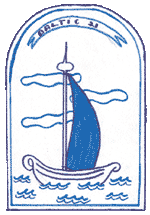
Kristine Leja, Latvia
Suggestions for schoolwork with Baltic 21 sector: Transport
Preparatory work:
- What kinds of jobs are connected to the transport sector in
your area?
- What infrastructure is present in your area? What transport
needs are there?
- What are the main negative impacts on the environment caused
by different kinds of transport?
- What indicators can be used to monitor the impact on the environment,
and on the cultural and historical heritage?
- In what way can transport be a threat to human and animal
health?
- What are the statistics on annual injuries and deaths due
to traffic in your country?
- Why do people prefer private cars to buses, trains or other
forms of public transport?
Practical work:
- Find out what percentage of your country’s land is used
for roads.
- Calculate how many kilometres your group travelled in one
week and find the difference in cost using different means of
trans-port.Try to include environmental aspects in your calculation.
- Calculate the CO2 emission resulting from travelling 100 km
using different means of transport.
- Examine the petrol prices and compare them with prices of
public transport for a similar distance.
- Construct maps for bicycle paths away from motor traffic.
Present the suggestions to your municipality and design a bicycle
promotion campaign.
- Make a plan for your city centre that prevents private cars
in the midst of urban dwellings but allows people to go shopping
using other means of transport.
- Biofuels, ethanol and cars using solar energy have been produced
for sustainable energy in the transport sector: Construct a
bicycle that can make use of wind energy.
- Transport of goods should be by sea or rail: Construct a map
in the Baltic Sea Region that would create suitable “new
Hanseatic routes”.
Discussion:
- How can public transport be made more attractive?
- How can cars be made to be environmentally friendly?
- How can the need for transport be reduced?

Euna Lazdina, Latvia

Denne side indgår i publikationen "EDUCATION FOR SUSTAINABLE
DEVELOPMENT" som kapitel 1 af 8
© Undervisningsministeriet 2003
|